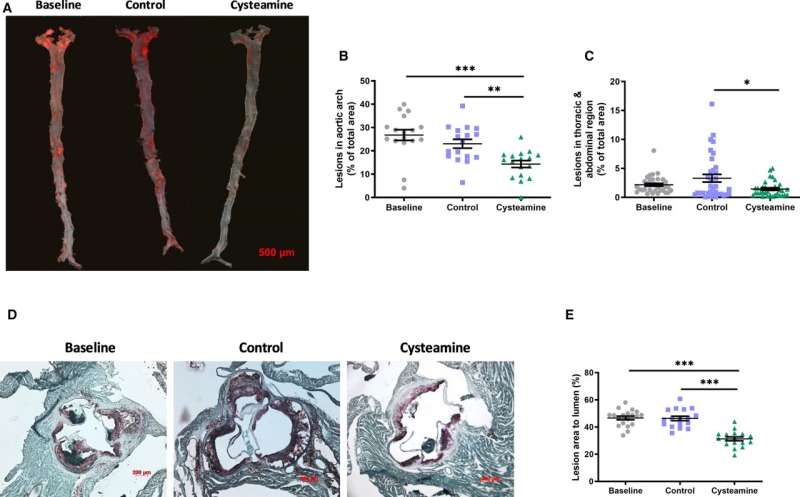
Data points show lesion areas in individual mice in each group in the aortic arch (B) and the rest of the thoracic plus abdominal aorta (C) of baseline, control, and cysteamine‐treated mice. Representative images to show atherosclerotic lesions in the aortic root (D) and lesion areas in individual mice (E).
There were 17 to 20 mice in each group, and the horizontal line shows the group mean±SEM. Data were analyzed by ANOVA, followed by the Tukey post hoc test. *P<0.05, **P<0.01, ***P<0.001. Credit: DOI: 10.1161/JAHA.120.017524
An antioxidant drug reverses atherosclerosis and could be used to prevent heart attacks and strokes due to clots, according to research funded by the British Heart Foundation (BHF) and published today in JAHA: Journal of the American Heart Association.
Atherosclerosis is the build-up of fatty deposits in the arteries. When a type of fat called LDL cholesterol becomes oxidized and builds up to form plaques in the artery walls, inflammation and damage increase which can cause the plaques to rupture and cause blood to clot.
These clots can block vital arteries that allow blood to flow to the heart, causing a heart attack, or to the brain causing a stroke.
Previously, researchers at the University of Reading discovered that LDL cholesterol can be oxidized in acidic small 'bags' called lysosomes in immune cells within the artery wall.
Now, Professor David Leake and his team have found that the antioxidant drug, cysteamine, has the power to switch off, and even reverse, this damaging process.
Cysteamine works by accumulating in the lysosomes and stops the oxidation of LDL cholesterol. It is already known to be safe in humans where it's used to treat a rare lysosomal disease called cystinosis. READ MORE
An antioxidant drug reverses atherosclerosis and could be used to prevent heart attacks and strokes due to clots, according to research funded by the British Heart Foundation (BHF) and published today in JAHA: Journal of the American Heart Association.
Atherosclerosis is the build-up of fatty deposits in the arteries. When a type of fat called LDL cholesterol becomes oxidized and builds up to form plaques in the artery walls, inflammation and damage increase which can cause the plaques to rupture and cause blood to clot.
These clots can block vital arteries that allow blood to flow to the heart, causing a heart attack, or to the brain causing a stroke.
Previously, researchers at the University of Reading discovered that LDL cholesterol can be oxidized in acidic small 'bags' called lysosomes in immune cells within the artery wall.
Now, Professor David Leake and his team have found that the antioxidant drug, cysteamine, has the power to switch off, and even reverse, this damaging process.
Cysteamine works by accumulating in the lysosomes and stops the oxidation of LDL cholesterol. It is already known to be safe in humans where it's used to treat a rare lysosomal disease called cystinosis. READ MORE